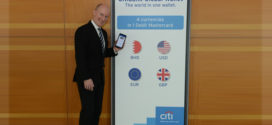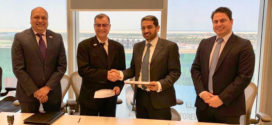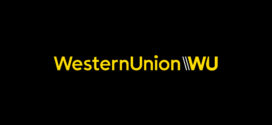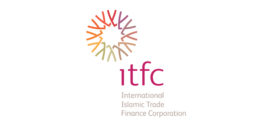Bridging the Gap between Arab and African Countries
Rabat –
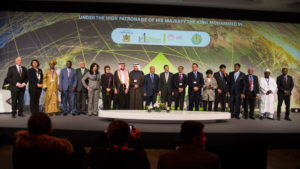 The Arab-Africa Trade Bridges Program was launched in Rabat in the 22nd and 23rd of February by the International Islamic Trade Finance Corporation (ITFC), member of the Islamic Development Bank Group, and the Minister-Delegate for Industry, Trade, Investment, and Digital Economy, in charge of Morocco’s Foreign Trade, has been concluded. The forum was organized on the occasion of launching the Arab-Africa Trade Bridges Program which aims at enhancing the trade relations, developing the business sector and promoting the economic cooperation between the two regions.
The Arab-Africa Trade Bridges Program was launched in Rabat in the 22nd and 23rd of February by the International Islamic Trade Finance Corporation (ITFC), member of the Islamic Development Bank Group, and the Minister-Delegate for Industry, Trade, Investment, and Digital Economy, in charge of Morocco’s Foreign Trade, has been concluded. The forum was organized on the occasion of launching the Arab-Africa Trade Bridges Program which aims at enhancing the trade relations, developing the business sector and promoting the economic cooperation between the two regions.
On the closing statement, the participants of the forum have assured that the forum’s great success, essential topics discussed and extensive high level of participation by governmental areas, trade support organizations and private sector, constitute promising elements and indicators to the success of the launch of the program and to the realization of its objectives.
The participants drew a number of recommendations targeting the enhancement and development of trade and economic cooperation between the Arab and African member countries of the Organization of Islamic Cooperation (OIC) , and highlighted the necessity for developing and promoting trade, being an essential drive for sustainable economic development and a support to job opportunities in both regions.
For the success of the program, the participants called for supporting the efforts of the Arab and African member countries in order to set the programs and execute mechanisms of the trade and economic partnership both bilaterally and regionally, as well as supporting the capabilities and organizational needs required by these countries to cope with such fields.
Delivering the opening address of the forum, Dr. Bandar bin Mohamed Hamza Hajjar, President of the Islamic Development Bank (IDB) Group has said: “The bank managed to develop a program for exchanging knowledge and expertise, in order to facilitate the transfer of experiences between the member countries in the different sectors”. Dr. Bandar has highlighted that the program achieved outstanding successes in a short period of time since its launch.
The recommendations of the forum’s closing statement included strengthening the advantage of the available and untapped trade opportunities in the two regions, developing fruitful economic and trade partnerships, work to achieve structured and fundable projects by the program’s partner institutions, the importance of supporting trade logistics and infrastructure between the two regions and supporting trade and credit insurance products.
On his part Eng. Hani Salem Sonbol, CEO of the International Islamic Trade Finance Corporation (ITFC) said in the opening address:” What we have witnessed during the recent years and felt from the desire of the African and Arab countries during the previous ministerial summits and conferences and the subsequent meetings of the standing committees of economic cooperation, emphasize the great importance of deepening such relations and speeding up the economic cooperation in order to take it further to desired levels.
Eng. Sonbol added that all Arab-African summits convened to date have called for and emphasized on the necessity of increasing trade and investment between the two regions. He said:” These summits have stressed that the focus of the Arab- African economic forum that accompany the Arab-African summits should be poured on strengthening the cooperation and building the capabilities as a foundation for encouraging trade and investment between the two regions”.
Eng. Sonbol has explained that trade volume between the Arab and African worlds does not rise to the level of the ambitions and aspirations of the two regions, stressing that according to the statistics of Islamic Center for Development of Trade, the share of the bilateral trade between the Arab and African countries equaled 2.1% in 2015.
In this respect, the support of the Islamic Development Bank (IDB) Group to the African development programs and infrastructure projects equaled US$43.3 billion, according to president’s statement. The supports included funding of projects in various sectors, while the funding of trade given to the member countries in Arab and African regions amounted to US$14.7 billion since the establishment of the organization in 2008.
The participants called for diversification and development of economic and trade cooperation between the two regions, especially in the sectors with potential great and untapped opportunities such as the leading modern sectors; industrial and ecological systems related to cars and chemicals, electrical equipment and machinery sectors and agricultural materials such as fertilizers, food industries and textile.
The participants of the forum have also studied the obstacles that impede the process of promoting trade and economic relations between the two regions.
In the closing statement, the participants called for encouraging and favoring the partnership projects between public and private sectors for executing national and regional infrastructures and logistical programs to facilitate trade, and account for the privacy and needs of the two regions.
It is worth to mention that the Arab-Africa Trade Bridges Program will continue for three years and will have a special committee to evaluate its results and monitor its prospects. Accordingly, the participants called the International Islamic Trade Finance Corporation (ITFC) to develop favorable mechanisms to be in line with and follow the program’s execution and also called the corporation to hold a regular meeting for the donors and partners to study its course and the upcoming phases.
ITFC pays special attention to the program, believing that it will create trade and investment opportunities between the Arab and African countries, yet supporting the social and economic developments in them. The corporation has also cooperated with the Coordination Group for enhancing cooperation between Trade Finance and Credit Insurance Institutions, in order to draw the Arab-African Trade Bridges Program and will work with its partners to execute it.
 Cash And Trade Magazine For Cash and Trade professionals in the Middle East
Cash And Trade Magazine For Cash and Trade professionals in the Middle East

